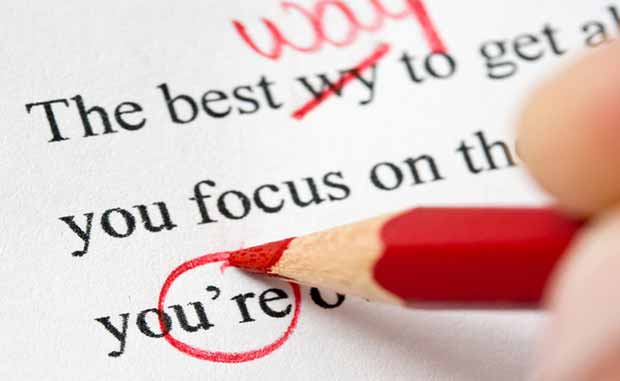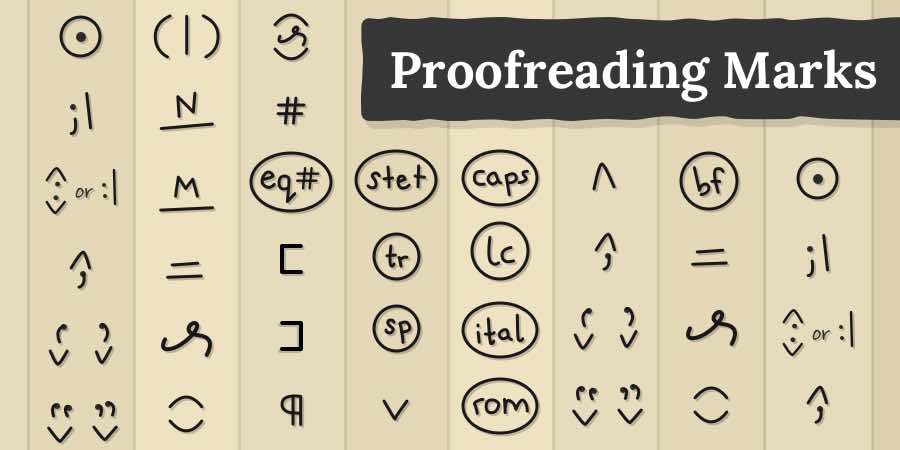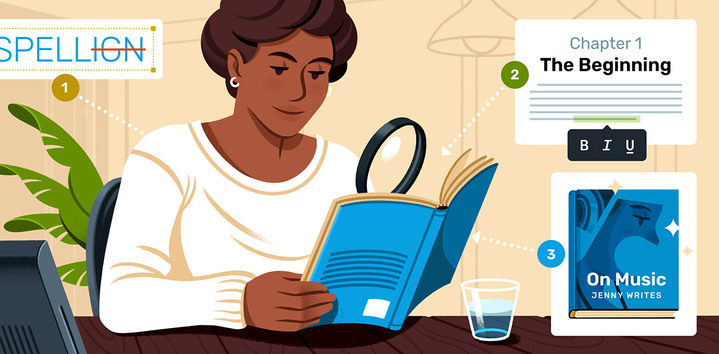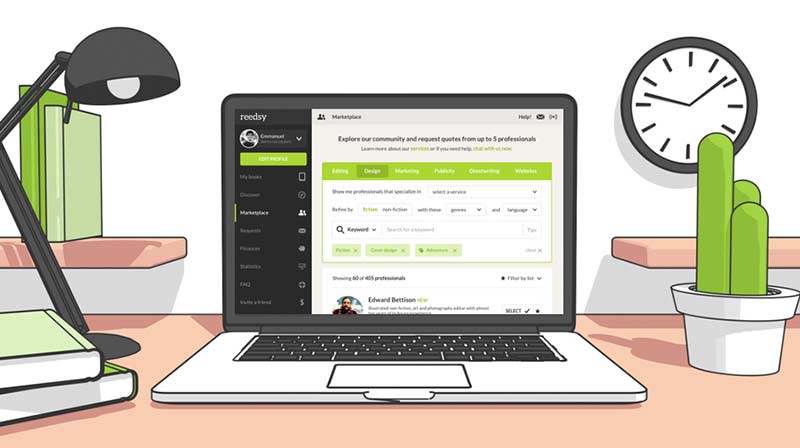What does a proofreader do?
Working with a proofreader is the final stage of the editing process. To ensure your book is ready to hit the presses (or the digital publisher), a proofreader will step in and double-check everything. They’ll make sure that your book is free from spelling mistakes, grammatical errors, and other issues that could spoil a reader’s enjoyment of your writing.
A professional proofreader not only has a keen eye for detail, but a tried-and-true method for spotting every minor error in your text, from missing commas to misused homophones. They’ll also keep your proof free from typographical and layout issues, such as the wrong typeface in one of your chapter headings, or awkwardly spaced lines within the text.
Essentially, a proofreader should have the attention of a devoted reader and the sharp mind of an editor — seeing everything, missing nothing. But where can you find a meticulous proofreader to guarantee that every last piece of your book is in place?
Look no further, here are the professionals who can help
Jonathan S.
I've spent 18 years editing debuts and bestsellers across genres, traditional and self-published. Agent/publisher queries. Caring, diligent.
view profileDiane L.
I am an enthusiastic, skilled children's book editor and writer with 25 years of experience in the publishing industry.
view profileEric S.
Eric is a literary agent and Young Adult author who has worked on award-winning and New York Times bestselling books.
view profileVanessa C.
I'm an award-winning Young Adult and Children's author who works as a literary consultant/editor in all genres, specialising in YA fiction.
view profileAly O.
Food, travel, literary + YA fiction, and mental health editor. Worked at SAGE, Phaidon, TripSavvy, Narrative Magazine, and Red Hen Press.
view profileWhat is the difference between a proofreader and other types of editors?
A proofreader is different from other types of editors in that they don’t provide particularly in-depth feedback on your book — proofreaders swoop in at the end to tweak and polish, not to overhaul your content. However, this doesn’t make their job any less important! Typo-free text and a professional layout are non-negotiable if you want your book to be taken seriously by readers, and indeed by the industry as a whole.
Another key difference between proofreaders and, say, copy editors is that proofreaders consider the entire book, not just the body text. For example, a proofreader will cross-check chapter names and numbers in a table of contents. They’ll check the dedication page, the acknowledgements, and anywhere else that text appears.
And again, in print publishing, a proofreader will also look at purely aesthetic elements. They might fix odd spacing or remove widows and orphans (isolated lines on the page) for a more pleasant reading experience. Overall, they make sure your book presents as smoothly as possible — which is why, as an author, you never want to skip the final proof.
Is a proofreader the same thing as a line editor?
It depends on where you are. In the UK, a “line editor” does serve almost the same purpose as a proofreader. The only difference is that the line edit is performed on the manuscript document, while the proofread is undertaken on the formatted document just before it goes to press. So an author in the UK may have either a line editor look at their manuscript or a proofreader look at the final proof, but usually not both.
In the US and Canada, however, line editing is typically used to describe a mix between content and developmental editing — in which the primary concern is the creative substance and style. Other times it describes a slightly more detailed version of copy editing.
Needless to say, if an editor’s résumé includes “line editing,” it’s best to clarify with them directly what they mean. Fortunately, all editors on Reedsy are categorized as developmental editors, copy editors, or proofreaders, so there’s no confusion about which services they can provide.
Do I need a proofreader if I’ve already worked with an editor?
In short, yes. While developmental and copy editors will fix inaccuracies and hone your writing style, they won’t catch every single mechanical mistake — and can even accidentally introduce them in the process of editing! This is exactly why proofreaders exist: to be the last line of defense against errors in your published book.
Many authors still attempt to proofread their own books, but we would caution against this. No matter how eagle-eyed you are, your brain will inevitably skip over typos that you’ve already seen a hundred times, simply because you’ve grown accustomed to them.
Indeed, for an effective proofread, you absolutely need a fresh perspective on your text. The good news is that you’re only a few clicks away from finding one!
How to find the right proofreader for you
On the Reedsy Marketplace, you can search for professionals by genre, location, and keywords, making it easy for you to find proofreaders with experience in your category and subject matter. If you want a nonfiction proofreader with an understanding of Lovecraftian naming conventions and Australian dialects, you can find them.
Once you’ve narrowed down your shortlist, you can send your project brief to up to five proofreaders. This will be a short overview of your book, including: what it’s about, your genre and word count, and whether it’s already been edited by a professional. You can also include your budget and ideal timeline to find the perfect person to work with you logistically.
The clearer you are in communicating your needs, the more likely our proofreaders are to respond with accurate quotes. And remember, for the best chance at landing your first-choice proofreader, try to send your requests as early as possible!




